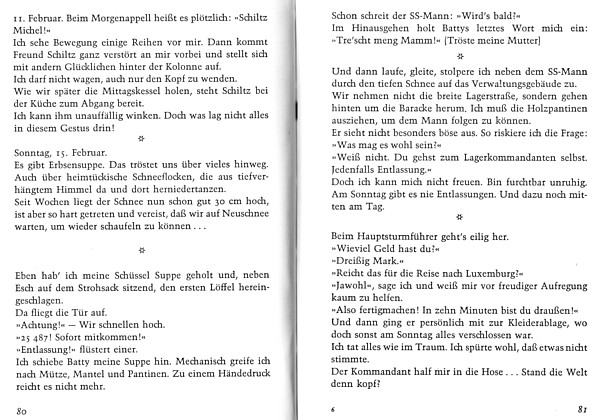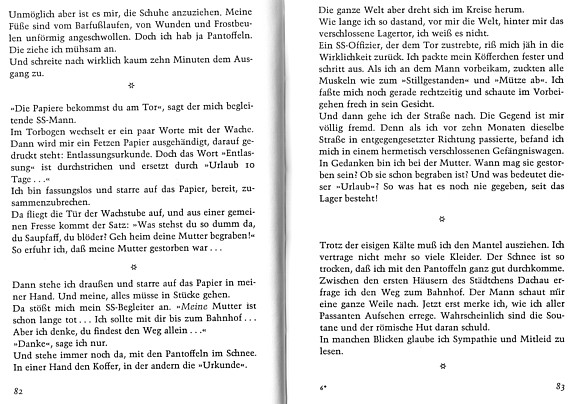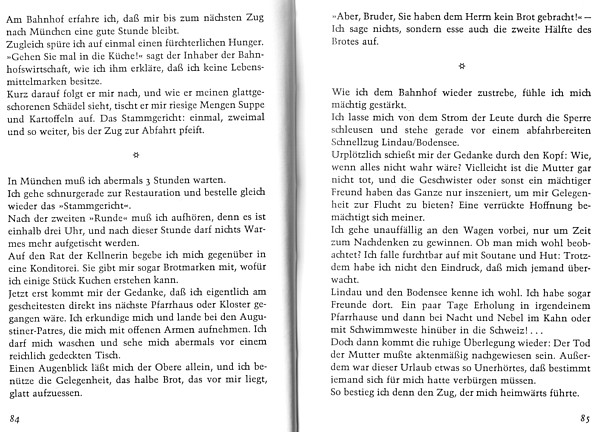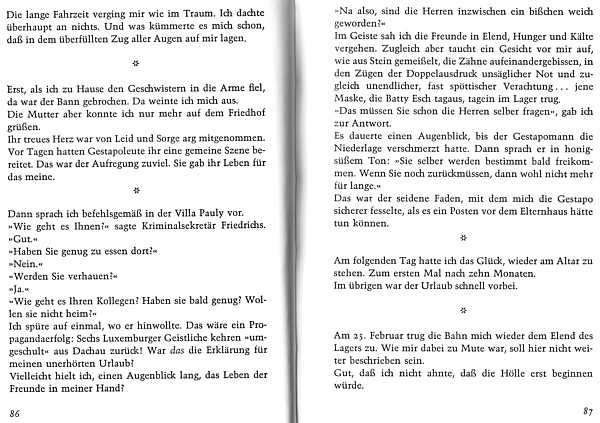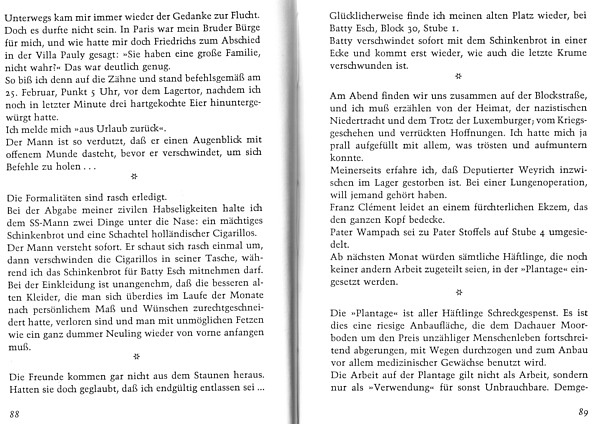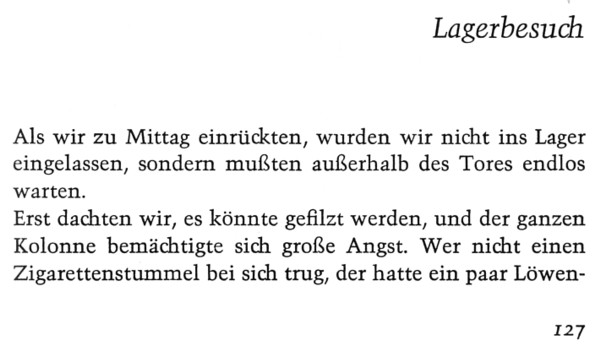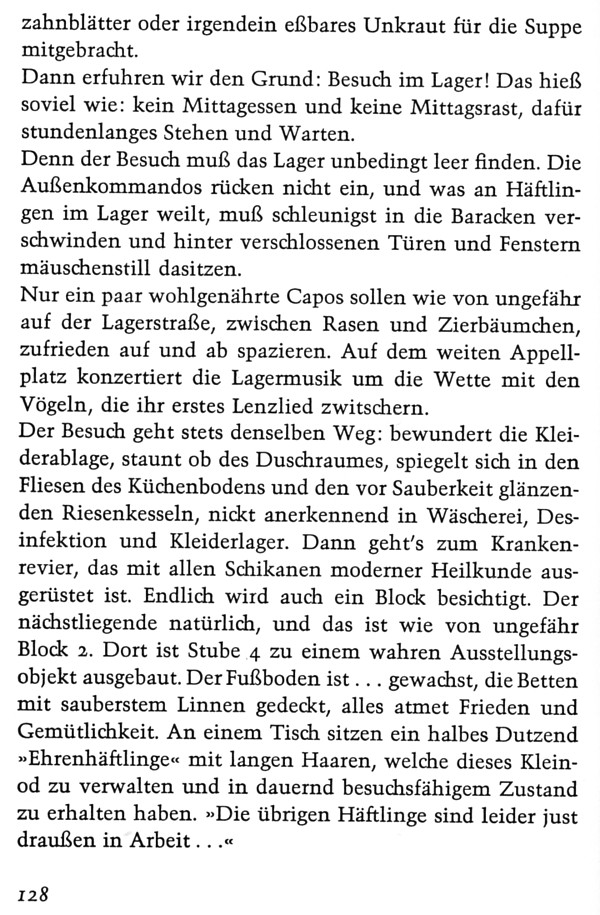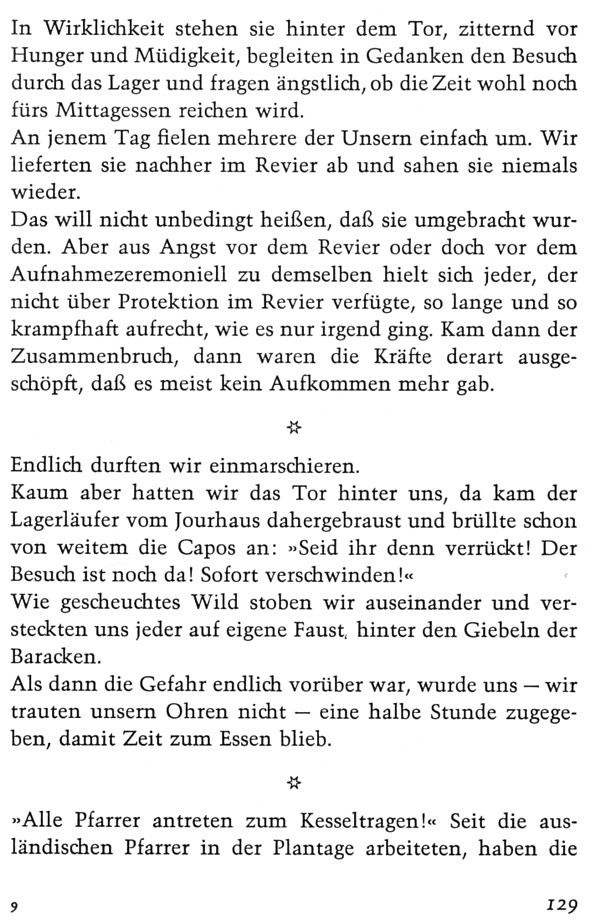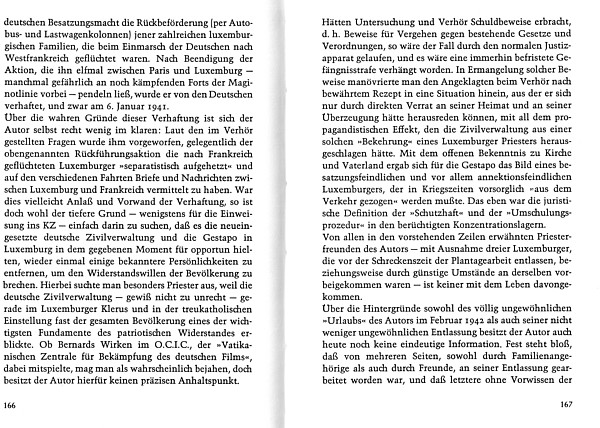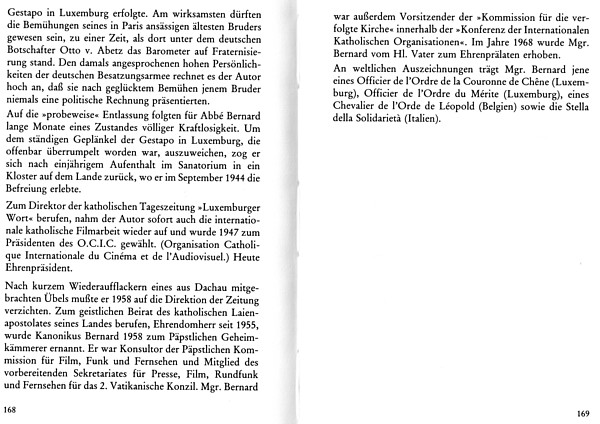|
[p. 80] 11.
Februar. Beim Morgenappell heißt es plötzlich: "Schiltz Michel!"
Ich sehe Bewegung einige Reihen vor mir. Dann kommt Freund Schiltz ganz
verstört an mir vorbei und stellt sich mit andern Glücklichen
hinter der Kolonne auf.
Ich darf nicht wagen, auch nur den Kopf zu wenden.
Wie wir später die Mittagskessel holen, steht Schiltz bei der Küche
zum Abgang bereit.
Ich kann ihm unauffällig winken. Doch was lag nicht alles in diesem
Gestus drin!
*
Sonntag, 15. Februar.
Es gibt Erbsensuppe. Das tröstet uns über vieles hinweg. Auch
über heimtückische Schneeflocken, die aus tiefverhängtem
Himmel da und dort herniedertanzen.
Seit Wochen liegt der Schnee nun schon gut 30 cm hoch, ist aber so hart
getreten und vereist, daß wir auf Neuschnee warten, um wieder schaufeln
zu können ...
*
Eben hab' ich meine Schüssel Suppe geholt und, neben Esch auf dem
Strohsack sitzend, den ersten Löffel hereingeschlagen.
Da fliegt die Tür auf.
"Achtung!" - Wir schnellen hoch.
"25 487! Sofort mitkommen!"
"Entlassung!" flüstert einer.
Ich schiebe Batty meine Suppe hin. Mechanisch greife ich nach Mütze,
Mantel und Pantinen. Zu einem Händedruck reicht es nicht mehr. [81]
Schon schreit der SS-Mann: "Wird's bald?"
Im Hinausgehen holt Battys letztes Wort mich ein: "Tre'scht meng Mamm!"
(Tröste meine Mutter)
*
Und dann laufe, gleite, stolpere ich neben dem SS-Mann durch den tiefen
Schnee auf das Verwaltungsgebäude zu.
Wir nehmen nicht die breite Lagerstraße, sondern gehen hinten um
die Baracke herum. Ich muß die Holzpantinen ausziehen, um dem Mann
folgen zu können.
Er sieht nicht besonders böse aus. So riskiere ich die Frage: "Was
mag es wohl sein?"
"Weiß nicht. Du gehst zum Lagerkommandanten selbst. Jedenfalls Entlassung."
Doch ich kann mich nicht freuen. Bin furchtbar unruhig. Am Sonntag gibt
es nie Entlassungen. Und dazu noch mitten am Tag.
*
Beim Hauptsturmführer geht's eilig her. "Wieviel Geld hast du?"
"Dreißig Mark."
"Reicht das für die Reise nach Luxemburg?"
"Jawohl", sage ich und weiß mir vor freudiger Aufregung kaum zu
helfen.
"Also fertigmachen! In zehn Minuten bist du draußen!"
Und dann ging er persönlich mit zur Kleiderablage, wo doch sonst
am Sonntag alles verschlossen war.
Ich tat alles wie im Traum. Ich spürte wohl, daß etwas nicht
stimmte.
Der Kommandant half mir in die Hose ... Stand die Welt denn kopf? [82]
Unmöglich aber ist es mir, die Schuhe anzuziehen. Meine Füße
sind vom Barfußlaufen, von Wunden und Frostbeulen unförmig
angeschwollen. Doch ich hab ja Pantoffeln. Die ziehe ich mühsam an.
Und schreite nach wirklich kaum zehn Minuten dem Ausgang zu.
*
"Die Papiere bekommst du am Tor", sagt der mich begleitende SS-Mann.
Im Torbogen wechselt er ein paar Worte mit der Wache. Dann wird mir ein
Fetzen Papier ausgehändigt, darauf gedruckt steht: Entlassungsurkunde.
Doch das Wort "Entlassung" ist durchstrichen und ersetzt durch "Urlaub
10 Tage ..."
Ich bin fassungslos und starre auf das Papier, bereit, zusammenzubrechen.
Da fliegt die Tür der Wachstube auf, und aus einer gemeinen Fresse
kommt der Satz: "Was stehst du so dumm da, du Saupfaff, du blöder?
Geh heim deine Mutter begraben!" So erfuhr ich, daß meine Mutter
gestorben war ...
*
Dann stehe ich draußen und starre auf das Papier in meiner Hand.
Und meine, alles müsse in Stücke gehen.
Da stößt mich mein SS-Begleiter an. "Meine Mutter ist schon
lange tot ... Ich sollte mit dir bis zum Bahnhof … Aber ich denke, du
findest den Weg allein ... "
"Danke", sage ich nur.
Und stehe immer noch da, mit den Pantoffeln im Schnee. In einer Hand den
Koffer, in der andern die "Urkunde". [83]
Die ganze Welt aber dreht sich im Kreise herum.
Wie lange ich so dastand, vor mir die Welt, hinter mir das verschlossene
Lagertor, ich weiß es nicht.
Ein SS-Offizier, der dem Tor zustrebte, riß mich jäh in die
Wirklichkeit zurück. Ich packte mein Köfferchen fester und schritt
aus. Als ich an dem Mann vorbeikam, zuckten alle Muskeln wie zum "Stillgestanden"
und "Mütze ab". Ich faßte mich noch gerade rechtzeitig und
schaute im Vorbeigehen frech in sein Gesicht.
Und dann gehe ich der Straße nach. Die Gegend ist mir völlig
fremd. Denn als ich vor zehn Monaten dieselbe Straße in entgegengesetzter
Richtung passierte, befand ich mich in einem hermetisch verschlossenen
Gefängniswagen. In Gedanken bin ich bei der Mutter. Wann mag sie
gestorben sein? Ob sie schon begraben ist? Und was bedeutet dieser "Urlaub"?
So was hat es noch nie gegeben, seit das Lager besteht!
*
Trotz der eisigen Kälte muß ich den Mantel ausziehen. Ich vertrage
nicht mehr so viele Kleider. Der Schnee ist so trocken, daß ich
mit den Pantoffeln ganz gut durchkomme. Zwischen den ersten Häusern
des Städtchens Dachau erfrage ich den Weg zum Bahnhof. Der Mann schaut
mir eine ganze Weile nach. Jetzt erst merke ich, wie ich aller Passanten
Aufsehen errege. Wahrscheinlich sind die Soutane und der römische
Hut daran schuld.
In manchen Blicken glaube ich Sympathie und Mitleid zu lesen. [84]
Am Bahnhof erfahre ich, daß mir bis zum nächsten Zug nach München
eine gute Stunde bleibt.
Zugleich spüre ich auf einmal einen fürchterlichen Hunger. "Gehen
Sie mal in die Küche!" sagt der Inhaber der Bahnhofswirtschaft, wie
ich ihm erkläre, daß ich keine Lebensmittelmarken besitze.
Kurz darauf folgt er mir nach, und wie er meinen glattgeschorenen Schädel
sieht, tischt er mir riesige Mengen Suppe und Kartoffeln auf. Das Stammgericht:
einmal, zweimal und so weiter, bis der Zug zur Abfahrt pfeift.
*
In München muß ich abermals 3 Stunden warten.
Ich gebe schnurgerade zur Restauration und bestelle gleich wieder das
"Stammgericht".
Nach der zweiten "Runde" muß ich aufhören, denn es ist einhalb
drei Uhr, und nach dieser Stunde darf nichts Warmes mehr aufgetischt werden.
Auf den Rat der Kellnerin begebe ich mich gegenüber in eine Konditorei.
Sie gibt mir sogar Brotmarken mit, wofür ich einige Stück Kuchen
erstehen kann.
Jetzt erst kommt mir der Gedanke, daß ich eigentlich am gescheitesten
direkt ins nächste Pfarrhaus oder Kloster gegangen wäre. Ich
erkundige mich und lande bei den Augustiner-Patres, die mich mit offenen
Armen aufnehmen. Ich darf mich waschen und sehe mich abermals vor einem
reichlich gedeckten Tisch.
Einen Augenblick läßt mich der Obere allein, und ich benütze
die Gelegenheit, das halbe Brot, das vor mir liegt, glatt aufzuessen.
[85]
"Aber, Bruder, Sie haben dem Herrn kein Brot gebracht!" Ich sage nichts,
sondern esse auch die zweite Hälfte des Brotes auf.
*
Wie ich dem Bahnhof wieder zustrebe, fühle ich mich mächtig
gestärkt.
Ich lasse mich von dem Strom der Leute durch die Sperre schleusen und
stehe gerade vor einem abfahrbereiten Schnellzug Lindau/Bodensee.
Urplötzlich schießt mir der Gedanke durch den Kopf: Wie, wenn
alles nicht wahr wäre? Vielleicht ist die Mutter gar nicht tot, und
die Geschwister oder sonst ein mächtiger Freund haben das Ganze nur
inszeniert, um mir Gelegenheit zur Flucht zu bieten? Eine verrückte
Hoffnung bemächtigt sich meiner.
Ich gehe unauffällig an den Wagen vorbei, nur um Zeit zum Nachdenken
zu gewinnen. Ob man mich wohl beobachtet? Ich falle furchtbar auf mit
Soutane und Hut: Trotzdem habe ich nicht den Eindruck, daß mich
jemand überwacht.
Lindau und den Bodensee kenne ich wohl. Ich habe so-gar Freunde dort.
Ein paar Tage Erholung in irgendeinem Pfarrhause und dann bei Nacht und
Nebel im Kahn oder mit Schwimmweste hinüber in die Schweiz! ...
Doch dann kommt die ruhige Überlegung wieder: Der Tod der Mutter
mußte aktenmäßig nachgewiesen sein. Außerdem war
dieser Urlaub etwas so Unerhörtes, daß bestimmt jemand sich
für mich hatte verbürgen müssen.
So bestieg ich denn den Zug, der mich heimwärts führte. [86]
Die lange Fahrzeit verging mir wie im Traum. Ich dachte überhaupt
an nichts. Und was kümmerte es mich schon,
daß in dem überfüllten Zug aller Augen auf mir lagen.
*
Erst, als ich zu Hause den Geschwistern in die Arme fiel, da war der Bann
gebrochen. Da weinte ich mich aus.
Die Mutter aber konnte ich nur mehr auf dem Friedhof grüßen.
Ihr treues Herz war von Leid und Sorge arg mitgenommen. Vor Tagen hatten
Gestapoleute ihr eine gemeine Szene bereitet. Das war der Aufregung zuviel.
Sie gab ihr Leben für das meine.
*
Dann sprach ich befehlsgemäß in der Villa Pauly vor.
"Wie geht es Ihnen?" sagte Kriminalsekretär Friedrichs.
"Gut."
"Haben Sie genug zu essen dort?"
"Nein."
"Werden Sie verhauen?"
"Ja."
"Wie geht es Ihren Kollegen? Haben sie bald genug? Wollen sie nicht heim?"
Ich spüre auf einmal, wo er hinwollte. Das wäre ein Propagandaerfolg:
Sechs Luxemburger Geistliche kehren "umgeschult" aus Dachau zurück!
War das die Erklärung für meinen unerhörten Urlaub?
Vielleicht hielt ich, einen Augenblick lang, das Leben der Freunde in
meiner Hand? [87]
"Na also, sind die Herren inzwischen ein bißchen weich geworden?"
Im Geiste sah ich die Freunde in Elend, Hunger und Kälte vergehen.
Zugleich aber taucht ein Gesicht vor mir auf, wie aus Stein gemeißelt,
die Zähne aufeinandergebissen, in den Zügen der Doppelausdruck
unsäglicher Not und zugleich unendlicher, fast spöttischer Verachtung
... jene Maske, die Batty Esch tagaus, tagein im Lager trug.
"Das müssen Sie schon die Herren selber fragen", gab ich zur Antwort.
Es dauerte einen Augenblick, bis der Gestapomann die Niederlage verschmerzt
hatte. Dann sprach er in honigsüßem Ton: "Sie selber werden
bestimmt bald freikommen. Wenn Sie noch zurückmüssen, dann wohl
nicht mehr für lange."
Das war der seidene Faden, mit dem mich die Gestapo sicherer fesselte,
als es ein Posten vor dem Elternhaus hätte tun können.
*
Am folgenden Tag hatte ich das Glück, wieder am Altar zu stehen.
Zum ersten Mal nach zehn Monaten.
Im übrigen war der Urlaub schnell vorbei.
*
Am 25. Februar trug die Bahn mich wieder dem Elend des Lagers zu. Wie
mir dabei zu Mute war, soll hier nicht weiter beschrieben sein.
Gut, daß ich nicht ahnte, daß die Hölle erst beginnen
würde. [88]
Unterwegs kam mir immer wieder der Gedanke zur Flucht. Doch es durfte
nicht sein. In Paris war mein Bruder Bürge für mich, und wie
hatte mir doch Friedrichs zum Abschied in der Villa Pauly gesagt: "Sie
haben eine große Familie, nicht wahr?" Das war deutlich genug.
So biß ich denn auf die Zähne und stand befehlsgemäß
am 25. Februar, Punkt 5 Uhr, vor dem Lagertor, nachdem ich noch in letzter
Minute drei hartgekochte Eier hinuntergewürgt hatte.
Ich melde mich "aus Urlaub zurück".
Der Mann ist so verdutzt, daß er einen Augenblick mit offenem Munde
dasteht, bevor er verschwindet, um sich Befehle zu holen ...
*
Die Formalitäten sind rasch erledigt.
Bei der Abgabe meiner zivilen Habseligkeiten halte ich dem SS-Mann zwei
Dinge unter die Nase: ein mächtiges Schinkenbrot und eine Schachtel
holländischer Cigarillos.
Der Mann versteht sofort. Er schaut sich rasch einmal um, dann verschwinden
die Cigarillos in seiner Tasche, während ich das Schinkenbrot für
Batty Esch mitnehmen darf. Bei der Einkleidung ist unangenehm, daß
die besseren alten Kleider, die man sich überdies im Laufe der Monate
nach persönlichem Maß und Wünschen zurechtgeschneidert
hatte, verloren sind und man mit unmöglichen Fetzen wie ein ganz
dummer Neuling wieder von vorne anfangen muß.
*
Die Freunde kommen gar nicht aus dem Staunen heraus. Hatten sie doch geglaubt,
daß ich endgültig entlassen sei ... [89]
Glücklicherweise finde ich meinen alten Platz wieder, bei Batty Esch,
Block 30, Stube I.
Batty verschwindet sofort mit dem Schinkenbrot in einer Ecke und kommt
erst wieder, wie auch die letzte Krume verschwunden ist.
*
Am Abend finden wir uns zusammen auf der Blockstraße, und ich muß
erzählen von der Heimat, der nazistischen Niedertracht und dem Trotz
der Luxemburger; vom Kriegsgeschehen und verrückten Hoffnungen. Ich
hatte mich ja prall aufgefüllt mit allem, was trösten und aufmuntern
konnte.
Meinerseits erfahre ich, daß Deputierter Weyrich inzwischen im Lager
gestorben ist. Bei einer Lungenoperation, will jemand gehört haben.
Franz Clément leidet an einem fürchterlichen Ekzem, das den
ganzen Kopf bedecke.
Pater Wampach sei zu Pater Stoffels auf Stube 4 umgesiedelt.
Ab nächsten Monat würden sämtliche Häftlinge, die
noch keiner andern Arbeit zugeteilt seien, in der "Plantage" eingesetzt
werden.
*
Die "Plantage" ist aller Häftlinge Schreckgespenst. Es ist dies eine
riesige Anbaufläche, die dem Dachauer Moorboden um den Preis unzähliger
Menschenleben fortschreitend abgerungen, mit Wegen durchzogen und zum
Anbau vor allem medizinischer Gewächse benutzt wird.
Die Arbeit auf der Plantage gilt nicht als Arbeit, sondern nur als "Verwendung"
für sonst Unbrauchbare. Demgemäss …
|
[p. 80] 11 February.
With the morning roll call it is called sudden: "Schiltz Michel!"
I see movement some rows in front of me. Then my friend Schiltz passes
me completely disturbed and gets in line with the other lucky ones behind
the column.
I don't dare to turn even my head. When we get the midday soup barrels
later, Schiltz is standing at the kitchen ready to go.
I can wave to him inconspicuously. But there was a lot more in that gesture!
*
Sunday, 15 February.
We're having pea soup. That gives us the comfort to ignore many things,
including the insidious snowflakes dancing down here and there from the
overcast sky.
For weeks the snow is already a good 30 cm high, but is so hard packed
and icy that we wait for fresh snow, to be able to dig again ...
*
I just got my dish of soup and, sitting beside Esch on the straw matrass,
ate my first spoonful.
Then the door flies open.
"Attention!" - we stand quickly.
"25,487! Come immediately!"
"Release!" someone whispers.
I push my soup to Batty. Mechanically I reach for cap, coat and [wood]
sandals. There isn't enough time for a handshake. [81]
Already the SS man shouts: "What's taking you!"
In going out Batty's last word catches me:
"Tre'scht mix Mamm!" (Comfort my mother)
*
And then I run, slide, trip beside the SS man through the deep snow to
the administration building. We don't take the broad camp street, but
go around behind the barracks. I must take the wooden sandals off, in
order to be able to follow the man.
He does not look particularly mad. So I risk a question: "What might
the reason be?"
"Don't know. You go to the commander of camp. In any case release."
But I cannot be happy. Am terribly nervous. On Sunday there are never
releases. Especially in the middle on the day.
*
The SS captain is in a rush. "How much money do you have?"
"Thirty Marks."
"Is that enough for the journey to Luxembourg?"
"Jawohl", I say and can hardly help myself I'm so happy and
excited.
"Get ready! In ten minutes you are outside!"
And then he took me into the clothing storage room himself, where on Sunday
everything was usually locked. I did everything as if in a dream. I probably
felt that something was wrong.
The commandant helped me into my trousers ... Was the world upside down?
[82]
But I couldn't put on my shoes. My feet are swollen shapeless from walking
barefoot, from wounds and frost boils. But I have slippers. I put those
on with difficulty.
And after hardly ten minutes I really am walking towards the exit.
*
"You get the papers at the gate" says the SS man accompanying
me.
Under the arch he exchanges a few words with the guard. Then a scrap of
paper is handed out to me, printed on it stands: Release document. But
the word "release" is crossed out and replaced by "vacation
10 days..."
I am speechless and stare at the paper, ready to collapse.
Then the door of the guardroom flies open, and from a mean mouth comes
the sentence: "What are you standing there so stupidly for, you pig
of a priest, you stupid jerk? Go home and bury your mother!" Thus
I learned that my mother had died...
*
Then I stand outside and stare at the paper in my hand. And I think everything
must break apart. Then my SS companion thumps me.
"My mother died a long time ago ... I should go with you to the station
... But I think you'll find the way alone... "
"Thanks" is all I say.
And keep standing there, in my slippers in the snow. In one hand the suitcase,
in the other one the "document". [83]
But the whole world is spinning. How long time I stood there like that,
the world in front of me, the locked camp gate behind me, I don't know.
An SS officer coming toward the gate, tore me suddenly back to reality.
I grabbed my little suitcase more firmly and stepped out. When I passed
the man, all of my muscles twiched to do "stand still" and "cap
off". I caught myself just in time and looked impudently into his
face as I passed him.
And then I follow to the road. The area is completely strange. Because
when I passed the same road in opposite direction ten months ago ago,
I was in a hermetically locked prison truck. In thoughts I am with my
mother. When can she have died? Whether she is already buried? And what
does this "vacation" mean? Nothing like this ever happened,
since the camp opened!
*
In spite of the icy cold weather I must take the coat off. I'm not used
to so many clothes anymore. The snow is so dry that I get by with the
slippers quite well. At the first houses of the small town Dachau I ask
the way to the station. The man watches me for quite a while after I continue.
Now I notice how I attract the attention of all passers-by. The cape and
the Roman hat are probably the cause.
In some looks I think I see sympathy and compassion. [84]
At the station I learn that I have a good hour until the next train leaves
for Munich.
I suddenly feel a dreadful hunger.
"Go into the kitchen!" the owner of the station restaurant says,
when I explain to him that I do not have any food coupons.
Shortly thereafter he follows me in, and when he sees my smooth-sheared
head, he serves me enormous quantities of soup and potatoes. The main
course: once, twice and so on, until the train whistles for its departure.
*
In Munich I again have to wait 3 hours.
I go straight to the restaurant and order the "main dish" again.
After the second "round" I must stop, because it is two-thirty,
and after that time nothing warm may be served.
On the waitress's advice I go across the street to a bakery. She even
gives me bread coupons, for which I can get a few pieces of cake.
Only now the thought comes to me that the smartest thing I could have
done would have been to go directly to the next parsonage or monastery.
I inquire and end up at the Augustiner fathers, who welcome me with open
arms. I can get washed and find myself again at a plentifully set table.
The father superior leaves me alone for an instant, and I use the opportunity
to eat up the half-loaf of bread that lies before me. [85]
"But brother, you didn't bring the gentleman any bread!" I don't
say anything, but eat up the second half of the loaf of bread as well.
*
When I'm going towards the station again, I feel mightily strengthened.
I let myself be driven by the flow of the people through the barrier and
stand right in front of a departure-ready express train to Lindau/Bodensee.
Suddenly the thought shoots into my head: What if everything is not true?
Perhaps my mother is not dead at all, and my siblings or some influential
friend only staged the whole thing in order to give me an opportunity
to escape? A crazy hope takes hold of me.
I go inconspicuously past the train cars just to gain time to think. Is
anyone watching me? I stand out terribly with cape and hat: Nevertheless
I don't have the impression that anyone is watching
me.
I know Lindau and the Lake of Constance well. I even have friends there.
A few days recovery in any parsonage building and then with night and
fog in a boat or a life jacket across to Switzerland! ...
But then the calm consideration comes back: My mother's death had to be
certified.
Additionally, this vacation so unheard of that someone must have vouched
for me.
So I got on the train, which led me homewards. [86]
The long trip passed as in a dream. I thought of nothing at all. And what
did I care that in the overcrowded train all eyes were looking at me.
*
When i first arrived at home I fell into my brothers' and sisters' arms
was the spell was broken. There I cried until I couldn't any longer.
But my mother I could only greet at the cemetery.
Her faithful heart was broken by suffering and worry. A few days ago the
Gestapo had made a nasty scene. That was too much excitement for her.
She gave her life for mine.
*
Then I reported as ordered to the Pauly villa.
"How are you?" asked criminal secretary Friedrichs.
"Good."
"Do you get enough to eat there?"
"No."
"Are you beaten?"
"Yes."
"How are your colleagues? Have they had enough already? Don't they
want to go home?"
Suddenly I realize what he's getting at. That would be a propaganda success:
Six Luxemburger clergyman return "retrained" from Dachau! Was
that the explanation for my unheard-of vacation?
Perhaps I held, for an instant, the lives of my friends in my hands? [87]
"Well then, did those gentlemen get a little softer in the meantime?"
In my mind I saw my friends dying in misery, hunger and cold. However
a face appears before me at the same time, as if cut from stone, with
clenched teeth, in the features the dual expression of unspeakable suffering,
and at the same time infinite, almost laughing disdain ... that mask that
Batty Esch carried day in, day out in the camp.
"You have to ask the gentlemen yourself ", I answered.
It took a moment before the Gestapo man had gotten over the defeat. Then
he spoke in a honey-sweet tone: "You will certainly soon be released.
If you have to go back, then probably not for long."
That was the slender thread with which the Gestapo bound me more securely,
than a guard in front of my parents' house could have done.
*
On the following day I had the pleasure to stand at the altar again. For
the first time in ten months. In all other respects the vacation went
by quickly.
*
On 25 February the train carried me back to the misery of the camp. How
I felt about that does not need to be described here.
It's good that I did not suspect that the real hell still lay ahead. [88]
On the way the thought of escaping came to me again and again. But I couldn't.
In Paris my brother was vouching for me, and as Friedrichs had said to
me at parting in the Pauly villa: "You have a large family?"
That was clear enough.
Thus I clenched my teeth and on 25 February at 5 o'clock sharp, stood
as ordered at the camp gate, after I had choked down three hardboiled
eggs at the last minute.
I announce myself "back from vacation".
The man is so taken aback that he stands there openmouthed for an instant,
before he disappears to get instructions ...
*
The formalities are rapidly taken care of. With the surrender of my civilian
belongings I show two things to the SS man: a big ham sandwich and a box
of Dutch Cigarillos. The man understands immediately. He takes a quick
look around, then the Cigarillos disappear into his pocket, while I may
take the ham sandwich for Batty Esch. Getting dressed it is unpleasant
that the better old clothes, which one had sewn over the months according
to personal measure and desires, are lost and one has to start from the
beginning again with impossible rags like a completely stupid beginner.
*
My friends can't get over it. They had believed that I was permanently
released ...
[89]
Fortunately I find my old place again, with Batty Esch, block 30, room
I.
Batty immediately disappears into a corner with the ham sandwich and comes
back only when the last crumb has disappeared.
*
In the evening we gather on the barrack street, and I have to tell about
our homeland, the Nazi deceit and the despicableness and the defiance
of the Luxemburgers; about the course of the war and crazy hopes. I had
filled myself up to bursting with everything that could comfort and cheer.
I also learn that delegate Weyrich has died in the meantime in the camp.
During a lung operation, someone claims to have heard.
Franz Clément suffers from a dreadful excema, which covers his
whole head.
Pater Wampach has moved to Pater Stoffels in room 4.
Starting next month all prisoners who have not yet been assigned to any
other work, will be put to work in the "plantation."
*
The "plantation" is every prisoners' nightmare. It is an enormous
cultivated area, which has been wrung out of the boggy Dachau soil at
the cost of innumerable human lives, criss-crossed by roads and used primarily
for the cultivation of medical plants.
The work on the plantation is not considered work, but only as a "use"
for otherwise useless people. Accordingly... |
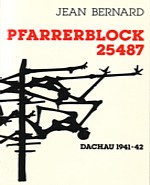
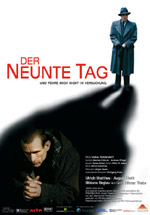 Page
introduction
(
Page
introduction
(